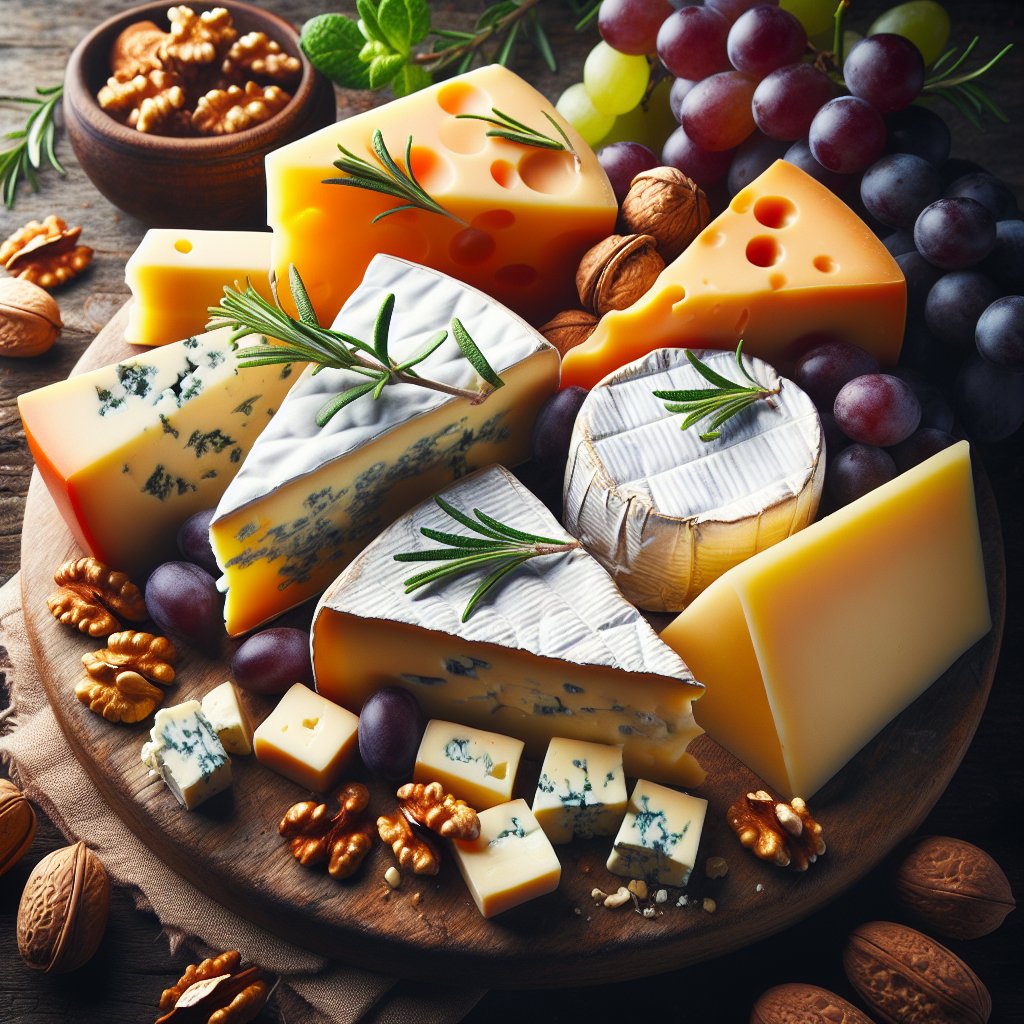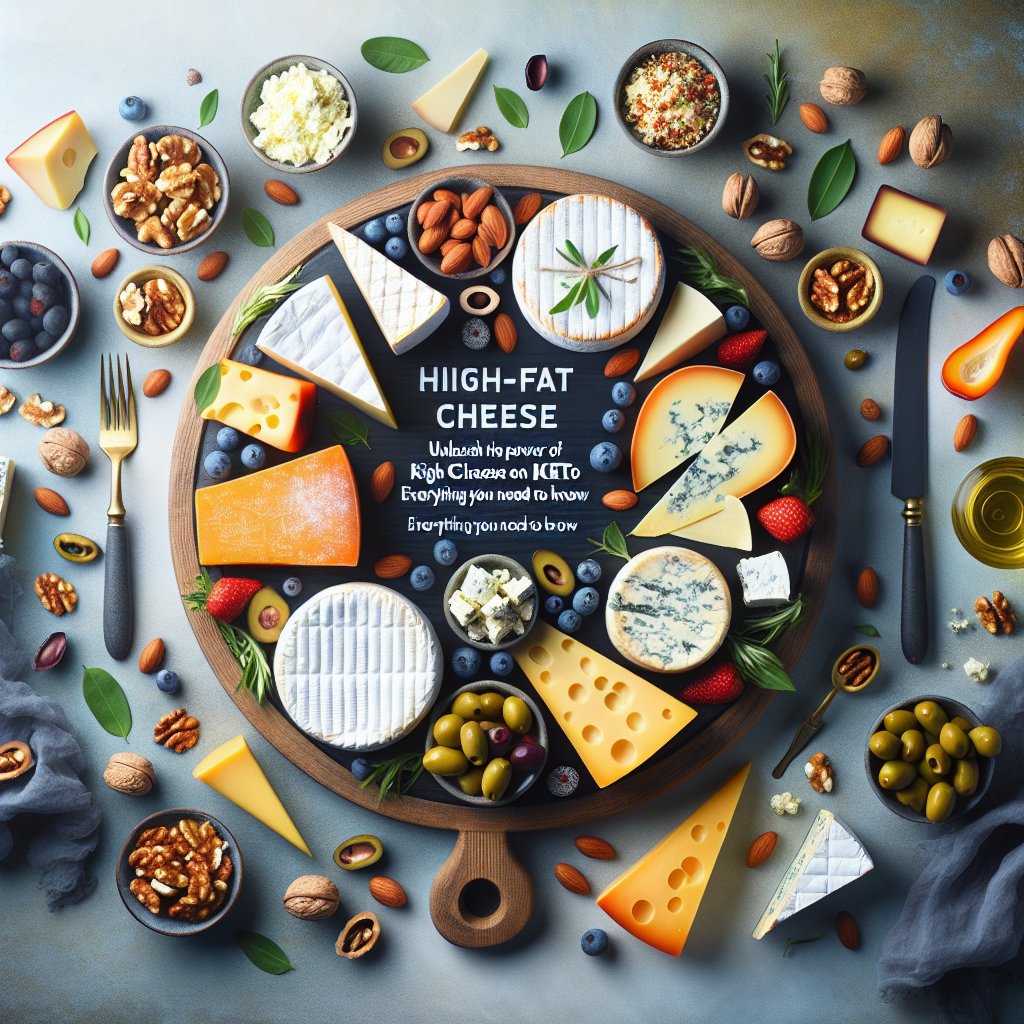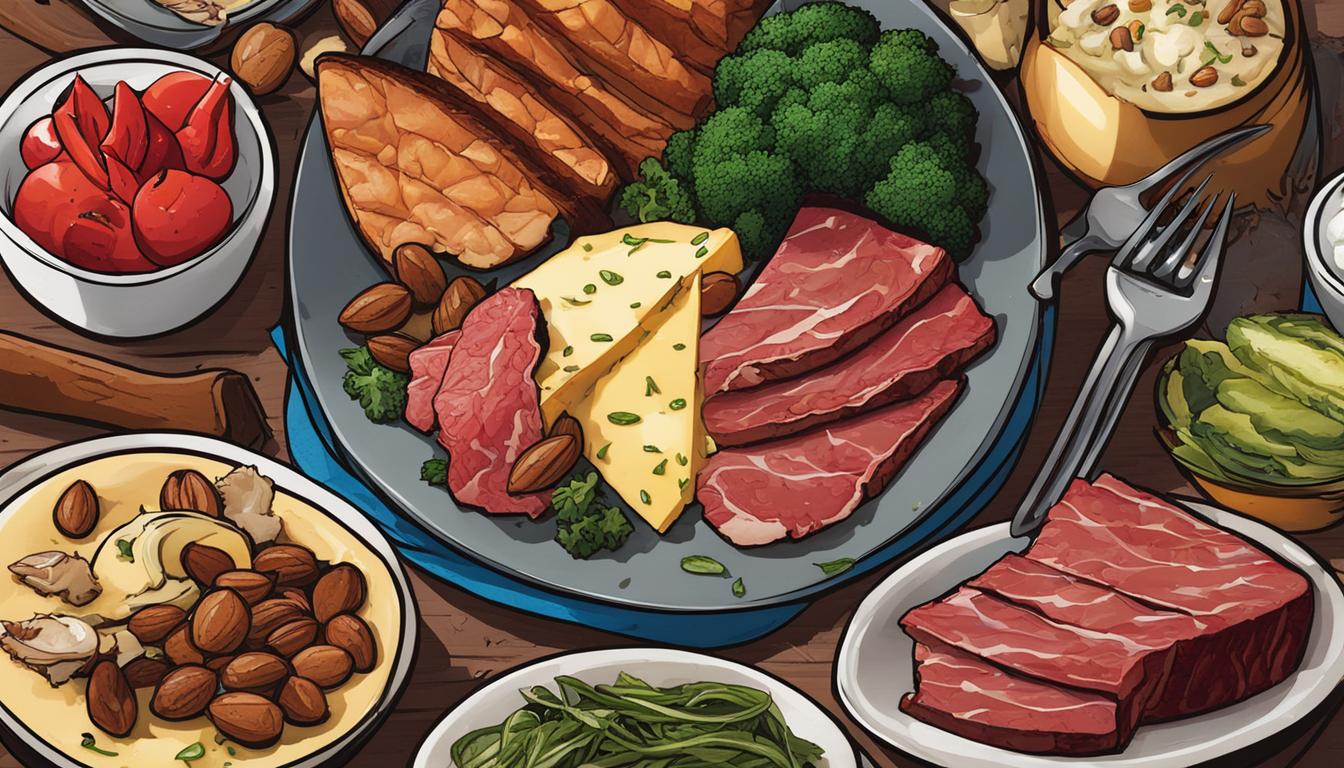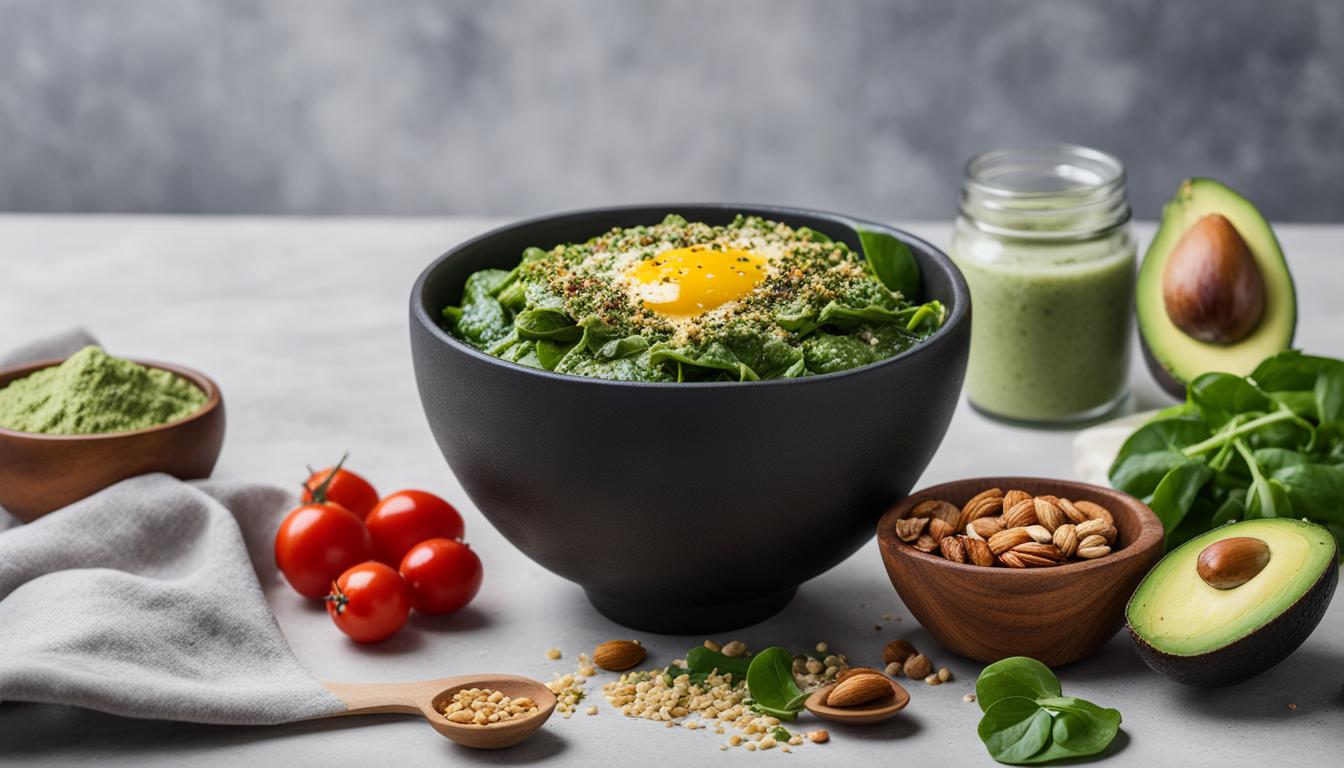Unleash the Power of High-Fat Cheese on Keto: Everything You Need to Know!
Unleash the Power of High-Fat Cheese on Keto: Everything You Need to Know!
Hey there, fellow keto enthusiasts! Today, we’re going to dive into the wonderful world of high-fat cheese and its remarkable role in the ketogenic diet. Whether you’re a cheese lover, a curious beginner, or someone seeking to elevate their keto journey, this article is packed with valuable insights and practical tips. So, let’s not waste another minute and unleash the power of high-fat cheese on keto!
Explaining the Ketogenic Diet
Before we embark on our cheesy adventure, let’s take a quick refresher on the ketogenic diet. The keto diet is a low-carb, high-fat eating plan designed to help your body reach a state of ketosis. In this metabolic state, your body becomes incredibly efficient at burning fat for fuel, leading to numerous health benefits, including weight loss, improved energy levels, and enhanced mental clarity.
Research conducted by the National Center for Biotechnology Information (NCBI) outlines the efficacy of the ketogenic diet in promoting weight loss and improving cardiovascular health. Moreover, studies have shown that the keto diet can aid in reducing inflammation and lowering the risk of chronic diseases.
The Role of High-Fat Cheese in the Ketogenic Diet
Now, let’s talk about everyone’s favorite topic: cheese! High-fat cheese is a star player in the keto playbook due to its excellent macronutrient profile. It’s low in carbohydrates and high in both fat and protein, making it an ideal choice for those following a ketogenic lifestyle.
Research published in the Journal of Nutrition suggests that the consumption of high-fat dairy products, such as cheese, is associated with a reduced risk of obesity and metabolic syndrome. This is attributed to the potential of high-fat dairy foods to improve satiety and regulate appetite, which can support weight management—an essential component of the ketogenic diet.
Starting with a strong foundation of understanding the ketogenic diet and the pivotal role of high-fat cheese sets the stage for our deep dive into the wonderful world of pairing, cooking, and maximizing the benefits of cheese on the keto diet. Get ready to have some fun while learning how to incorporate this delightful ingredient into your daily keto life!

Benefits of High-Fat Cheese on Keto Diet
If you’re a cheese lover, you’ll be delighted to know that high-fat cheese can be a valuable addition to your ketogenic diet. Contrary to popular belief, the high-fat content in cheese can actually offer several health benefits when consumed as part of a well-rounded keto meal plan.
Rich Source of Healthy Fats
High-fat cheese is a rich source of healthy fats, including saturated fats and monounsaturated fats. These fats play a crucial role in the ketogenic diet as they help the body enter and maintain a state of ketosis. Ketosis is the metabolic state in which the body burns fat for fuel instead of carbohydrates, making high-fat cheese an ideal choice for those following a keto lifestyle.
Provides Essential Nutrients
Additionally, high-fat cheese is packed with essential nutrients such as calcium, protein, and vitamin B12. Calcium is vital for maintaining strong bones and teeth, while protein is essential for muscle repair and growth. Vitamin B12 is important for nerve function and the production of DNA. Including high-fat cheese in your diet can contribute to meeting your daily nutrient requirements.
Supports Weight Loss and Satiety
Studies have shown that the consumption of high-fat dairy products, including cheese, can aid in weight loss and promote feelings of fullness and satisfaction. The high-fat content in cheese can help you feel satiated, reducing the likelihood of overeating and snacking between meals. This can be particularly beneficial for individuals following a ketogenic diet, where appetite control and sustainable weight management are key factors.
Incorporating high-fat cheese into your keto diet can provide both culinary enjoyment and potential health advantages. Remember to consume it in moderation and choose high-quality, full-fat cheese varieties to maximize the benefits while minimizing unnecessary additives.
Next, let’s explore the best types of high-fat cheese to include in your ketogenic meal plan!
Types of High-Fat Cheese for Keto
Are you a cheese lover looking to add some delicious variety to your keto diet? Then you’re in luck! High-fat cheeses are not only incredibly tasty but also make for a perfect addition to your keto lifestyle. They are rich in fats and low in carbs, making them an excellent choice for those following a ketogenic diet.
Cheddar Cheese
Cheddar cheese is a popular option for keto enthusiasts. It’s a rich source of saturated fats and has virtually no carbs. Plus, it’s incredibly versatile and can be enjoyed on its own as a snack or incorporated into a wide range of keto-friendly recipes.
Brie Cheese
Brie cheese, with its creamy texture and earthy flavor, is another excellent choice for individuals on a keto diet. It is high in fat and low in carbs, making it a delectable option for adding a touch of sophistication to your cheese platter or keto-friendly appetizers.
Cream Cheese
Cream cheese is a staple in many keto recipes, thanks to its high fat content and minimal carbs. Whether you use it to make a luscious cheesecake or add a dollop to your morning scrambled eggs, cream cheese is a versatile and tasty addition to your keto meal plan.
Gouda Cheese
Gouda cheese is a semi-hard cheese known for its rich and nutty flavor. It is high in fat and low in carbs, making it a great choice for keto dieters. Enjoy it as a satisfying snack or use it to elevate the flavor of your keto-friendly casseroles and omelets.
Incorporating these high-fat cheeses into your keto diet can add variety and satiety to your meals while keeping you on track with your macronutrient goals. So go ahead and indulge in the creamy, savory goodness of these delectable cheeses while staying true to your keto journey!
Nutritional Value of High-Fat Cheese
When it comes to the ketogenic diet, high-fat cheese is a superstar! Not only is it delicious, but it also offers an array of essential nutrients that can complement your keto lifestyle.
Macronutrient Content
High-fat cheese, such as cheddar, gouda, and brie, is a rich source of healthy fats and protein. A 1-ounce (28g) serving typically provides around 9g of fat and 7g of protein, making it a perfect choice for those following a high-fat, moderate-protein diet like keto.
Low Carbohydrate Content
One of the beauties of high-fat cheese is its low carbohydrate content. Most varieties contain less than 1g of carbohydrates per ounce, making it an excellent option for maintaining ketosis. This means you can enjoy your favorite cheese guilt-free while staying in ketosis.
Nutrient Density
Besides the macronutrient profile, high-fat cheese is also packed with essential vitamins and minerals. It contains calcium, phosphorus, and vitamin A, which are all vital for overall health. Calcium, in particular, is essential for maintaining bone health, which is often a concern for those following ketogenic diets.
Additionally, high-fat cheese is a good source of conjugated linoleic acid (CLA), a type of fat that has been linked to various health benefits, including improved body composition and reduced risk of heart disease.
Therefore, incorporating high-fat cheese into your keto diet not only adds delicious flavor and richness to your meals but also provides a variety of essential nutrients to support your well-being.
Next, let’s delve into the incredible versatility of high-fat cheese and how you can creatively incorporate it into your keto meal plan.
Providing Creative and Tasty Ideas for Incorporating High-Fat Cheese into Keto Meals
When it comes to the ketogenic diet, high-fat cheese is like a superstar ingredient. Not only does it add delicious flavor and creamy texture to meals, but it’s also a fantastic source of healthy fats. If you’re looking to jazz up your keto meals with high-fat cheese, here are some creative and tasty ideas to incorporate it into your diet:
Cheesy Cauliflower “Mac” and Cheese
Swap out the traditional macaroni with steamed cauliflower florets for a low-carb, keto-friendly version of this classic comfort food. Mix in a combination of high-fat cheeses like cheddar, gruyere, and cream cheese for a rich and indulgent dish. Top with a crispy, crunchy layer of melted parmesan for some added texture.
Keto Cheese Stuffed Meatballs
Elevate your meatballs by stuffing them with cubes of high-fat cheese like mozzarella or gouda. As they bake, the cheese melts and oozes out, creating a mouthwatering, gooey center that’s sure to impress your taste buds. Serve with a side of zucchini noodles or a refreshing salad for a complete keto meal.
Ultimate Cheese Platter
Assemble a stunning cheese platter featuring an array of high-fat cheeses such as brie, camembert, blue cheese, and aged cheddar. Pair the cheeses with keto-friendly charcuterie, nuts, berries, and olives for a delightful and satisfying snack or appetizer spread.
Get creative in the kitchen and experiment with different high-fat cheese varieties to discover new flavor combinations that excite your palate while keeping you on track with your keto lifestyle. High-fat cheese is a versatile ingredient that can add a delectable touch to a wide array of keto dishes.
By incorporating these delicious ideas into your meal planning, high-fat cheese can play a starring role in making your ketogenic journey flavorful and enjoyable.

Potential Side Effects of Consuming High-Fat Cheese on Keto
When it comes to enjoying high-fat cheese on the ketogenic diet, it’s essential to be mindful of potential side effects and considerations. While cheese can be a delicious and convenient source of healthy fats, there are some things to keep in mind.
Digestive Issues
For some individuals, consuming high-fat cheese can lead to digestive discomfort such as bloating, gas, or diarrhea, especially if they are not used to a high-fat diet. This is because cheese contains lactose and high-fat content, which might be harder for some people to digest.
Sodium Intake
Many types of cheese, especially processed ones, can be high in sodium. Excessive sodium intake can lead to water retention and high blood pressure in some individuals. It’s important to choose natural, low-sodium cheeses and be mindful of overall sodium intake when incorporating high-fat cheese into your keto diet.
Consideration for Weight Loss Plateaus
While high-fat cheese can be a great addition to a ketogenic diet, some individuals may experience weight loss plateaus if they overconsume high-fat dairy. This is because the body will prioritize burning the dietary fat before tapping into its own fat stores, potentially stalling weight loss progress. It’s important to moderate portions and balance fat intake from other sources.
By being aware of these potential side effects and considerations, you can enjoy high-fat cheese on the keto diet while minimizing any possible drawbacks.
Expert Tips for Choosing and Storing High-Fat Cheese
When it comes to the ketogenic diet, high-fat cheese can be a delicious and satisfying part of your meal plan. Not only does it add richness and flavor to your dishes, but it also provides essential nutrients and healthy fats. Here are some expert tips for choosing and storing high-fat cheese to maintain its freshness and quality.
Selection Tips
When selecting high-fat cheese for your keto lifestyle, opt for varieties that are minimally processed and have a high fat content. Look for options such as brie, camembert, gouda, cheddar, and blue cheese, which are rich in flavor and provide a good amount of healthy fats. These cheeses are also versatile and can be enjoyed on their own or incorporated into a variety of keto-friendly recipes.
Additionally, consider choosing organic and grass-fed options when available. These cheeses are often higher in beneficial nutrients like omega-3 fatty acids and have a more robust flavor profile. When purchasing pre-packaged cheese, check the label for any added sugars or fillers that can impact their carb content.
Storage Tips
To maintain the freshness and quality of high-fat cheese, proper storage is key. After purchasing your cheese, store it in the refrigerator at the recommended temperature, which is typically around 35 to 45°F (1.6 to 7.2°C). It’s essential to keep the cheese wrapped in its original packaging or re-wrap it in cheese paper or wax paper to allow it to breathe while preventing excessive moisture loss.
Avoid storing high-fat cheese in plastic wrap or airtight containers as these can trap excess moisture and lead to spoilage. If you notice any moisture on the cheese or its packaging, gently pat it dry before re-wrapping for storage. Additionally, it’s best to keep different types of cheeses separate to prevent them from imparting flavors onto each other.
Remember to take your high-fat cheese out of the refrigerator 30 minutes before serving to allow it to come to room temperature. This enhances the flavors and textures, making your cheese-eating experience even more enjoyable.
By following these expert tips for choosing and storing high-fat cheese, you can ensure that your keto-friendly cheese stays fresh, flavorful, and ready to elevate your meals and snacks.
Conclusion
High-fat cheese is a powerhouse ingredient that can truly take your ketogenic diet to the next level. Throughout this article, we’ve explored the many benefits of incorporating high-fat cheese into your keto lifestyle. Here’s a quick summary of the key points:
Rich Source of Healthy Fats
High-fat cheese is a rich source of healthy saturated fats, such as conjugated linoleic acid (CLA) and omega-3 fatty acids. These fats are essential for brain function, hormone production, and overall cellular health.
Low in Carbohydrates
Cheese is naturally low in carbohydrates, making it a fantastic option for those following a ketogenic diet. This means you can indulge in its creamy goodness without worrying about spiking your blood sugar levels.
Protein and Nutrient Content
In addition to healthy fats, high-fat cheese is also packed with protein, calcium, and other essential nutrients. These play a crucial role in supporting muscle health, bone strength, and overall vitality.
Satiety and Weight Management
The combination of healthy fats and protein in high-fat cheese helps promote feelings of fullness and satiety. This can aid in weight management by reducing overall food intake and preventing mindless snacking.
Flavor and Versatility
From creamy brie to sharp cheddar, high-fat cheese varieties offer a wide range of flavors and textures, making it a versatile ingredient for many keto-friendly dishes and snacks.
By adding high-fat cheese to your ketogenic diet, you’re not only enhancing the taste of your meals but also reaping the benefits of its nutrient profile. So go ahead, unleash the power of high-fat cheese and elevate your keto journey to a whole new level!


